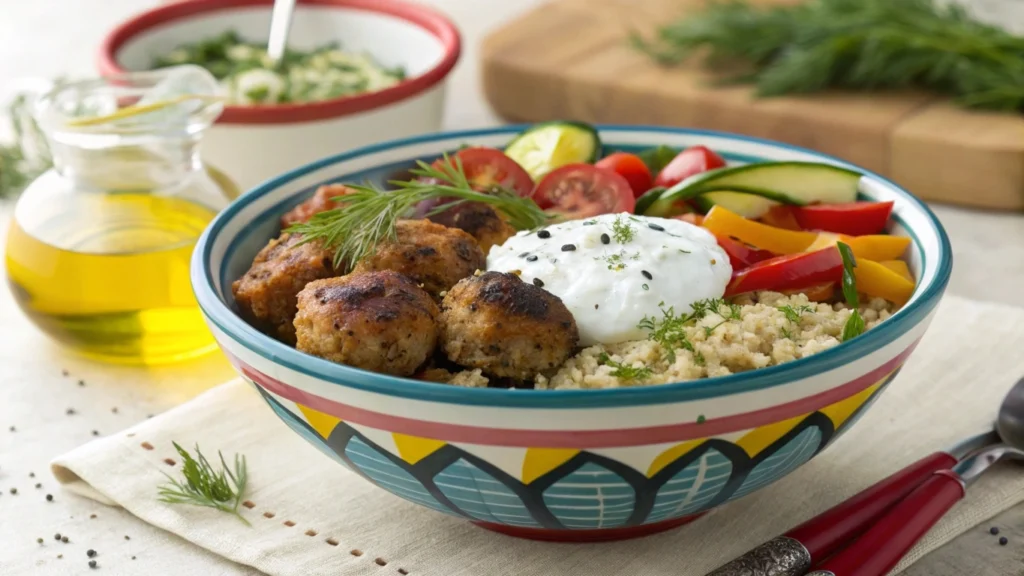Mediterranean cuisine is celebrated worldwide for its vibrant flavors and healthful ingredients. Among its many delights, Greek chicken meatballs stand out as a versatile dish that’s easy to prepare and packed with savory goodness. By combining lean ground chicken with fresh herbs, spices, and creamy feta cheese, these tender, juicy meatballs create a dish that’s as wholesome as it is flavorful.
Ingredients That Make Greek Chicken Meatballs Unique
Key Ingredients in Greek Chicken Meatballs
What makes Greek chicken meatballs so irresistible? It’s all in the ingredients. Each element is thoughtfully chosen to create a dish that bursts with flavor and texture. Here’s a closer look:
- Fresh Mediterranean Herbs: The inclusion of mint and basil brings a refreshing, aromatic touch, giving the meatballs their distinctive Greek flair.
- Feta Cheese: Crumbled feta adds a salty, tangy depth of flavor. It also helps keep the meatballs moist.
- Whole Wheat Panko Breadcrumbs: These breadcrumbs offer a subtle crunch while binding the meatballs together. For a gluten-free option, swap these with rolled oats or gluten-free breadcrumbs.
The Role of Tzatziki Sauce
Tzatziki sauce isn’t just a side dish it’s the soul of this recipe. Its creamy texture and tangy flavor complement the savory meatballs perfectly. Made with Greek yogurt, grated cucumber, garlic, dill, and lemon juice, it adds a cooling balance to the warm spices in the meatballs.
For additional tips on pairing dishes with tzatziki, check out this guide on Greek Chicken Meatballs: A Delicious Mediterranean Delight.
Step-by-Step Guide to Making Greek Chicken Meatballs
Preparing the Ingredients
Start by gathering all the ingredients. Prepping beforehand ensures a smooth cooking process:

- Mince garlic, chop herbs, and crumble feta cheese.
- Combine breadcrumbs with a beaten egg to create a binder.
- Grate cucumber for the tzatziki sauce and strain out excess water to avoid a watery dip.
Mixing and Forming the Meatballs
In a large mixing bowl, blend the ground chicken with herbs, feta, garlic, egg, and breadcrumbs. Gently mix until just combined overmixing can lead to dense meatballs. Shape the mixture into 1-1/2-inch balls for even cooking.
Baking for the Perfect Texture
Place the meatballs on a greased baking tray. Bake at 350°F for about 20–25 minutes, or until the internal temperature reaches 165°F. Baking is a healthier alternative to frying, reducing unnecessary fat while keeping the meatballs juicy.
Making Homemade Tzatziki Sauce
While the meatballs bake, whip up the tzatziki sauce. Combine Greek yogurt, strained cucumber, minced garlic, lemon juice, and dill. Add salt to taste. The result is a refreshing sauce that ties the dish together.
Variations of Greek Chicken Meatballs
Alternative Meat Options: Turkey or Lamb
If you’re looking to switch things up, ground turkey or lamb makes excellent substitutes for chicken in this recipe. Turkey offers a similar lightness to chicken but with a slightly richer flavor. Lamb, on the other hand, brings a robust, savory profile that pairs wonderfully with the Mediterranean spices.
Tip: Use lean turkey or lamb to keep your meatballs healthy yet flavorful.
Adding Spinach for a Nutritional Boost
Sneak in some greens by mixing finely chopped spinach into the meatball mixture. Spinach not only boosts the nutritional value but also adds moisture, keeping your meatballs tender. If using frozen spinach, ensure you squeeze out all excess water to avoid a soggy mixture.
Making Gluten-Free Greek Chicken Meatballs
For a gluten-free option, swap whole wheat panko breadcrumbs with gluten-free breadcrumbs, almond meal, or rolled oats. The texture remains light, and the meatballs stay perfectly intact.
Incorporating Red Onion for Texture
Diced red onion can add a mild crunch and subtle sweetness to your Greek chicken meatballs. Mix it finely into the ground chicken to ensure even distribution of flavor.
For more Mediterranean-inspired recipe ideas, check out our guide to Tzatziki Chicken Salad.
How to Serve Greek Chicken Meatballs
Pairing with Mediterranean Side Dishes

Greek chicken meatballs are versatile and pair beautifully with many side dishes. Serve them over lemon Parmesan orzo for a complete meal, or alongside a Greek salad loaded with cucumbers, tomatoes, olives, and feta cheese.
Pro Tip: Grilled vegetables like zucchini, eggplant, or asparagus make an excellent accompaniment to these meatballs.
Using Meatballs in Bowls, Pitas, or Wraps
Turn your Greek chicken meatballs into a satisfying lunch or dinner by adding them to a pita or wrap. Layer the meatballs with fresh lettuce, sliced cucumbers, red onions, and a dollop of tzatziki sauce for a quick and flavorful handheld meal.
For a healthier option, build a Mediterranean-inspired bowl. Start with a base of quinoa or couscous, then add meatballs, roasted veggies, and drizzle everything with tzatziki.
Creative Presentation Ideas for Hosting
Planning a dinner party? These meatballs make a delightful appetizer. Serve them on skewers with a small bowl of tzatziki for dipping. For a more formal setup, plate the meatballs on a bed of orzo with a drizzle of olive oil and a garnish of fresh dill.
For more creative Mediterranean recipes, explore our Ultimate Guide to Tzatziki Dishes.
Storage and Freezing Tips for Greek Chicken Meatballs
How to Store in the Refrigerator
Proper storage is key to enjoying leftover Greek chicken meatballs without losing their flavor and texture. Place cooled meatballs in an airtight container and refrigerate. They’ll stay fresh for up to four days. Keep the tzatziki sauce in a separate container to prevent the meatballs from becoming soggy.
Pro Tip: Reheat meatballs in the oven at 300°F for about 10 minutes for even warming without drying them out.
Freezing Meatballs for Long-Term Use
Greek chicken meatballs are freezer-friendly, making them perfect for meal prep. Arrange cooked and cooled meatballs on a baking sheet, ensuring they don’t touch, and freeze until solid. Transfer the frozen meatballs to a freezer-safe bag or container.
- Storage Duration: Meatballs can be frozen for up to three months.
- Thawing Method: Thaw overnight in the refrigerator and reheat before serving.
Important: Avoid freezing tzatziki sauce, as the yogurt may separate and become grainy when thawed. Instead, make fresh sauce when serving frozen meatballs.

